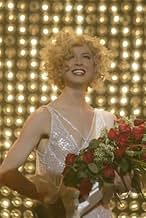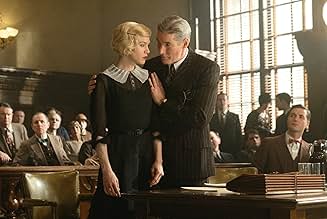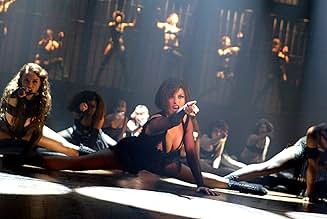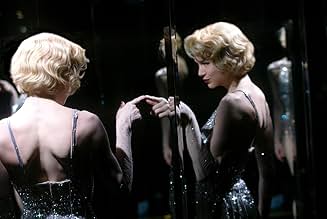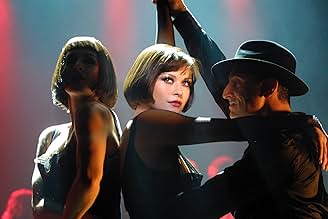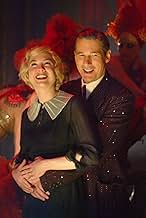Duas assassinas no corredor da morte desenvolvem uma rivalidade feroz enquanto competem por publicidade, celebridade e a atenção de um advogado de má qualidade.Duas assassinas no corredor da morte desenvolvem uma rivalidade feroz enquanto competem por publicidade, celebridade e a atenção de um advogado de má qualidade.Duas assassinas no corredor da morte desenvolvem uma rivalidade feroz enquanto competem por publicidade, celebridade e a atenção de um advogado de má qualidade.
- Direção
- Roteiristas
- Artistas
- Ganhou 6 Oscars
- 59 vitórias e 129 indicações no total
Avaliações em destaque
Told one way, the story of "Chicago" sounds like a showbusiness drama: a young girl dreams of stardom. She is initailly naive but learns quickly, rising into the blaze of limelight while an older, more experienced rival resents the new face that's stealing the show. The twist is that the art is murder, and the stage is comprised of the papers, the radio, the courthouse, and the all-devouring public eye. The veteran is Velma Kelly (Catherine Zeta-Jones), a nightclub singer who did in her husband and sister after finding them in what is usually called "a compromising position." The newcomer is Roxie Hart (Renee Zelweiger), a cutie-pie who shot her lover after finding out he was using her, and who expects her husband Amos (John C. Reilly, excellent as the quintessentail doormat) to stand by her afterwards. Both women are represented by Billy Flynn (Richard Gere), who brags he can beat any rap for the right price and is probably what Shakespeare had in mind when he made that crack about killing all the lawyers. Flynn's formula is simple: turn the client into a media darling, spin a tragic tale of the good girl ruined by bad choices, and an aquittal is certain.
"Chicago" is a musical, and the film uses a gimmick of establishing two worlds: the real Chicago and a surreal fantasy world in the form of a Jazz-Age theater, where the song and dance takes place. In many musicals this wouldn't work, but here it makes sense. Director Rob Marshall fuses the two worlds together very well, creating images that compliment each other effectively. Some of the concepts look like things you'd see in an editorial cartoon: a press conference becomes a ventroliquist act and puppet show, a trial is depicted as a literal circus. Others offer a reflection of the character's inner self: Amos, in the guise of a baggy-pants comic, bemoans the fact that, like all second banannas, nobody really notices him--even the fantasy audience seems indifferent to his performance (which is, in truth, wonderful).
The ensemble all turns in excellent performances in the acting category, but the singing is more uneven. Zeta-Jones has by far the best voice of the leads, as exemplified by the casually sensual "All That Jazz." Zelweiger is passable, mostly because one gets the impression that her Roxie has more charm and determination than actual talent. Gere only barely manages with the music, and does so mainly on the grounds that Billy Flynn isn't one of the more vocally difficult roles in the music theater cannon. But what he lacks in pipes he makes up for in the character department: his Flynn is a perfectly charismatic scoundrel, one whose talent and danger is in his ability to be so charming. Taye Diggs, who presides over the dream world as the Bandleader, doesn't get to sing, which is a shame because he can--he was in the original cast of "Rent"--but works very well with what he's given.
The mix of glitter and grime in "Chicago" is reminicent of last year's "Moulin Rouge," but those who thought the latter too excessive will probably find this one more appealing. Any fan of music theater, however, will not want to miss this film--it may just be the rebirth of the movie musical we've been hearing about.
It's one of the best cinematic musicals, with a superb translation from stage to screen that immediately gets you looking for theatrical performance tickets once the titles roll. The performances are sublime, the songs and lyrics superb, and the joy you walk away with overwhelming.
To tell the truth, I've never been much of a fan of the stage show. Bob Fosse (with help from John Kander and Fred Ebb) designed the show as a series of vaudeville skits tied together by the flimsiest of books. If you like revues with great choreography, the show worked fine; if you were looking for an actual "musical", you were better advised to look elsewhere. Prior to this film, I'd have thought that you'd also have to look elsewhere to find good material for a film.
Then came Rob Marshall. Conceiving the show as events as seen through Roxie Hart's (Renee Zellweger) imagination, the dance numbers become believable because she truly sees all the world as a stage. In effect, what Marshall has done is substitute Roxie for the theater's live audience and, in the process, made the theatrical touches plausible within the film's context. In doing so, Marshall has relied upon superb editing and choreography to keep up the pace and continuity (such as it is) of the film.
Perhaps the best example of this is "Cell Block Tango," which on stage is a stylized number that is removed from the central action of what book there is. In the film, the number arises from various conversations Roxie has had with other prisoners, focused through her show-biz crazy mind, and puts her own acts in context. Likewise, "They Both Reached for the Gun," played as a ventiloquist act in which her mouthpiece Billy Flynn (Richard Gere) pulls both Roxie's strings and those of the press, and uses Roxie's mind as the filter to point up the ease in which the public can be manipulated.
In choreographing these numbers, Marshall has also done an impressive job. Rather than merely revive Fosse's choreography from the 1975 production, he seems inspired by it to create new choreography that plays off the editing for maximum effect. The two aforementioned numbers are excellent examples of this choreographic technique, as well as "All That Jazz" (intercutting between a vaudeville dance act and two plot threads), "Mr. Cellophane" (beautifully performed by John C. Reilly, as Roxie's schlepp of a husband), "I Can't Do It Alone" and "Razzle Dazzle." Marshall also allows a dose of sanity to slip into the proceedings with a non-musical number, in which a seemingly wrongfully convicted woman is put to death -- the scene slams the brakes for a moment, lest we be completely seduced by the glitter or Roxie's perspective, and lose our own rational perspective on right, wrong and justice. It's a jarring moment, but a responsible (and some may say necessary) one.
The performances are, for the most part, up to the task. Catherine Zeta-Jones richly earned her Oscar as Velma Kelly -- vocally, choreographically, and in the acting department. Gere is also very good (his tap dance number is truly impressive), and John C. Reilly (as Roxie's schlepp husband) and Queen Latifah (as an opportunistic warden) are outstanding. In fact, the weakest performance in the film is Zellweger, and this seems more of a fault of the script than Zellweger. Even though most of the film focuses on her, she remains a cipher at the end of the picture, most likely because the central conceit of the film (Roxie's perception of events) gets in the way of her character development. She still does the best job she can with what she's given with an underwritten part (to be fair, the part is even less well written for the stage version).
Did "Chicago" deserve to beat "Gangs of New York" or "The Pianist" for Best Picture? I'm not sure. All I know is that the film is an incredible achievement given its source material and the natural disadvantages of converting musicals to film. Marshall set out to climb K-2, and he reached the top.
Still, I must point out the singing and songs were great and the story was a huge improvement over the Ginger Rogers film (which was wretched). It was well made and I was particularly impressed by Zeta-Jones (who won the Best Supporting Actress Oscar for it), Gere and John C. Reilly. They really worked their butts off and impressed me. So, because so much was right about this film I certainly recommend it. It's just too bad they didn't get the details right or even try when it came to all the minor characters and costumes. Oh well, you can't win 'em all.
Oscars Best Picture Winners, Ranked
Oscars Best Picture Winners, Ranked
Você sabia?
- CuriosidadesIn the beginning of the scene introducing Matron Mama Morton (Queen Latifah) to the new inmates, Roxie Hart (Renée Zellweger) has a brief conversation with a woman smoking a cigarette. That character is played by long-time Broadway actress Chita Rivera, who portrayed Velma Kelly in the original 1975 production of "Chicago."
- Erros de gravaçãoThere are 50 stars on the US flag in the courtroom (should be 48).
- Citações
June: I'm standin' in the kitchen, carving up a chicken for dinner, minding my own business, when in storms my husband, Wilbur, in a jealous rage. "You've been screwing the milkman," he said. He was crazy, and he kept on screaming, "You've been screwing the milkman." And then he ran into my knife... he ran into my knife ten times.
- Cenas durante ou pós-créditosNear the end of the credits, just so there are no doubts: Catherine Zeta-Jones' singing and dancing performed by Catherine Zeta-Jones Renée Zellweger's singing and dancing performed by Renée Zellweger Richard Gere's singing and dancing performed by Richard Gere
- Versões alternativasThe musical number "Class," featuring Queen Latifah and Catherine Zeta-Jones, was deleted from the final version of the film. However, it was recut into the movie for a brief, extremely limited theatrical re-release in the summer of 2003. It then appeared on DVD as a bonus feature, but was NOT intercut there.
- Trilhas sonorasOverture/And All That Jazz
Music by John Kander
Lyrics by Fred Ebb
Performed by Catherine Zeta-Jones, Renée Zellweger, and Taye Diggs
Published by Unichappell Music, Inc. (BMI)
Principais escolhas
Detalhes
- Data de lançamento
- Países de origem
- Centrais de atendimento oficiais
- Idiomas
- Também conhecido como
- Chicago: The Musical
- Locações de filme
- Ontario Legislature Building, Queen's Park, Toronto, Ontário, Canadá(as courthouse steps for press conference)
- Empresas de produção
- Consulte mais créditos da empresa na IMDbPro
Bilheteria
- Orçamento
- US$ 45.000.000 (estimativa)
- Faturamento bruto nos EUA e Canadá
- US$ 170.687.518
- Fim de semana de estreia nos EUA e Canadá
- US$ 2.074.929
- 29 de dez. de 2002
- Faturamento bruto mundial
- US$ 306.777.366
- Tempo de duração1 hora 53 minutos
- Cor
- Mixagem de som
- Proporção
- 1.85 : 1
Contribua para esta página








